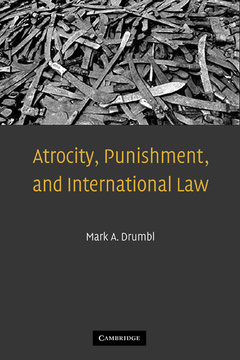Atrocity, Punishment, and International Law
Langue : Anglais
Auteur : Drumbl Mark A.

This book examines the sentencing differences for atrocities such as genocide in an international setting.
This book argues that accountability for extraordinary atrocity crimes should not uncritically adopt the methods and assumptions of ordinary liberal criminal law. Criminal punishment designed for common criminals is a response to mass atrocity and a device to promote justice in its aftermath. This book comes to this conclusion after reviewing the sentencing practices of international, national, and local courts and tribunals that punish atrocity perpetrators. Sentencing practices of these institutions fail to attain the goals that international criminal law ascribes to punishment, in particular retribution and deterrence. Fresh thinking is necessary to confront the collective nature of mass atrocity and the disturbing reality that individual membership in group-based killings is often not maladaptive or deviant behavior but, rather, adaptive or conformist behavior. This book turns to a modern, and adventurously pluralist, application of classical notions of cosmopolitanism to advance the frame of international criminal law to a broader construction of atrocity law and towards an interdisciplinary, contextual, and multicultural conception of justice.
1. Extraordinary crime and ordinary punishment: an overview; 2. Conformity and deviance; 3. Punishment of international crimes in international criminal tribunals; 4. Punishment of international crimes in national and local criminal justice institutions; 5. Legal mimicry; 6. Quest for purpose; 7. From law to justice; 8. Conclusion: some immediate implications.
Mark A. Drumbl is Professor of Law at the School of Law, Washington & Lee University, where he also serves as Director of the Transnational Law Institute, and has repeatedly held the Ethan Allen Faculty Fellowship. He studied at McGill University (BA, MA), Institut d'etudes politiques, University of Toronto (LL.B.), and Columbia University (LL.M., J.S.D.) and has held visiting appointments at University College, University of Oxford, Trinity College Dublin, Vanderbilt University, and the University of Ottawa. In 2005 his academic work received the Association of American Law Schools Scholarly Papers Prize and in 2003 the International Association of Penal Law (US Section) Best Article Prize. Dr Drumbl has published extensively on international law and criminal justice, including in the NYU, Michigan, and North-western law reviews, Human Rights Quarterly, the American Journal of International Law, and the Columbia Journal of Transnational Law. He has also authored chapters in edited volumes and frequently speaks at academic conferences and symposia. Prior to entering law teaching, Dr. Drumbl was judicial clerk to Justice Frank Iacobucci of the Supreme Court of Canada. His practice experience includes an appointment as co-counsel for the Canadian Chief-of-Defense Staff before the Royal Commission investigating military wrongdoing in the UN Somalia Mission. Professor Drumbl has served as an expert in litigation in the US federal courts, as defense counsel in the Rwandan genocide trials, and has taught international law in Pakistan and Brazil. He is a frequent commentator in national print media, radio, and television.
Date de parution : 06-2007
Ouvrage de 318 p.
15.6x23.4 cm
Date de parution : 04-2007
Ouvrage de 318 p.
15.6x23.4 cm
Thème d’Atrocity, Punishment, and International Law :
© 2024 LAVOISIER S.A.S.



